Peter MALONE
Saturday, 18 September 2021 19:57
Mad Holiday
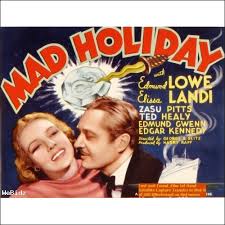
MAD HOLIDAY
US, 1936, 69 minutes, Black and white.
Edmund Lowe, Elissa Landi, Zasu Pitts, Ted Healy, Edmund Gwenn, Edgar Kennedy, Soo Yong, Water Kingsford.
Directed by George B. Seitz.
Mad Holiday is a slight supporting feature from MGM in the mid 1930s. It takes some pokes at the film industry itself, the company making a series of second-rate murder mysteries with a star detective, his being identified with his role by adoring fans, his wanting rest and to get out of the stereotype. He is played in a debonair style by Edmund Lowe.
The film has him going on a cruise, besieged at the wharf by adoring fans and, especially, the comedian, Zasu Pitts, who declares her devotion to him – and, during the film, is seen as putting away quite a number of drinks with the alleged reason that the cherries go to her pet dog.
While the actor is welcomed on board by the captain, there are various mysterious goings on, especially concerning a diamond, some jewel thieves, a Chinese woman who wants to buy the diamond. When a dead body is found in the actor’s cabin, and a mysterious blonde, Elissa Landi, seems to be involved, it is revealed as a stunt for films, the perpetrator being the author of the novels, revealed to be a woman who took her grandfather’s photo and name! Needless to say, this offers the basis for a romance.
Then there are more dead bodies, a reporter and his cameraman intruding at every possible moment – and then the reporter locked in a shower – the authorities on the ship being very wary. And, all the time, there is the very British assistant to the jewel dealer who was murdered and who seems very obliging, especially as played by Edmund Gwenn. The mystery is finally unravelled, with the help of the actor himself and his masked encounter with the murderer, his being disguised as a Chinese – not very convincing for anyone except the man being accosted! The villain is Edmund Gwenn who suddenly bursts into very American intonations, explaining that he was putting on the British accent (however, his British accent is the real one and the American accent seems terribly artificial and strained).
A pleasant time passer in the vein of the 1930s.
Published in Movie Reviews
Published in
Movie Reviews
Tagged under
Saturday, 18 September 2021 19:57
Ricki and the Flash
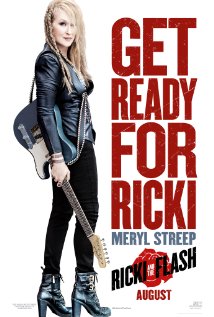
RICKI AND THE FLASH
US, 2015, 103 minutes, Colour.
Meryl Streep, Kevin Klein, Mamie Gummer, Audra Mc Donald, Rick Springfield, Sebastian Stan, Ben Platt, Hailey Gates.
Directed by Jonathan Demme.
So, what were we expecting? Rock ‘n’ roll? Meryl Streep as a rocker? Another performance where Meryl Streep completely immerses herself in her character? Yes to all of the above. And that is definitely what we get.
It is not as if Meryl Streep had not sung in films before. She had many songs in Postcards from the Edge, some comic singing in Death Becomes Her, singing the role of the Witch in Sondheim’s Into the Woods – and, of course, Mamma Mia. It is not as if Meryl Streep can’t sing – but for this role, as with all her roles, she did her homework and training, the range of songs by a number of songwriters from Tom Petty to Bruce Springsteen, and learning to play the guitar as well. There are quite a number of songs, most of them in the Calilfornia club where she and her band, Ricky and The Flash, have been entertaining the locals, generally a rough and ready but enthusiastic audience, for years. And, as might be hoped for, Ricky and the Flash perform a grand finale at the family wedding.
We are introduced to Ricky, braids and heavy make-up, rock ‘n’ roll costumes, belting out the songs, playing with her band and with Greg, Rick Springfield able to play his music and in a sympathetic role. Then, we see her the next day, working the supermarket at the checkout, with the young enthusiastic floor manager continually urging her to smile, something which he continually demonstrates.
Then a phone call, to come home to the family she had abandoned decades earlier, with her daughter, Julie, in crisis after being abandoned by her husband. Now, she is Linda, her ordinary name, and she decides to travel to Indianapolis, and the mansion, clean and orderly and luxurious, where her former husband, Pete, Kevin Kline, has lived with their children, Julie and two sons, married to Maureen, whom we don’t see at first and perhaps judge her a bit too superciliously because of Linda’s reaction to the almost-perfect house, but in fact, as we get to know her, she is probably the most sympathetic character in the film, played by Audra Mc Donald – and, interestingly, it is an inter-racial marriage which is taken for granted, never even commented on.
Julie is played by Mamie Gummer, Meryl Streep’s daughter who has appeared with her in other films. They play well together, Julie on medication and somewhat out of it, gradually mellowing with her mother’s exuberant presence, which includes going out to eat doughnuts and a hair and make-up makeover – and also her mother telling off the ex-husband and his girlfriend when they happen to see them in restaurant. Julie is depressed and is in therapy, helped by her mother – who later glimpses and realises just how much influence Maureen has had for the good and the better during her long absence.
The other crisis is the forthcoming wedding of one of the sons and his rather snobbish fiancee. The son has kept in touch with his mother, but the influence of his fiancee and family means that she is not invited to his wedding, just as she was not invited to Julie’s. The other son is gay and is critical of his mother, accusing her of homophobia. And this is mainly at a dinner sequence in a restaurant, one of those exceedingly loud and embarrassing dinners with aggression.
The film is a story of sadness and regrets, a story of dreams, career and selfish decisions, but it is also a story of hope, finishing on a happily dancing ending, courtesy of bringing Bruce Springsteen’s music, and the realisation that, although it is late, it is not too late to make some kind of reparation and, even within the limits of circumstances that cannot be changed, to bring some love and hopeful expectations.
The director, Jonathan Demme, has made a number of documentaries about musicians and concerts, as well is such films as Silence of the Lambs, Rachel at the Wedding. The writer, Diablo Cody, has been responsible for Juno, Young Adult and episodes of The United States of Tara. It is not great, but it is very enjoyable – and, once again, as for almost four decades, admiration for Meryl Streep.
1. Expectations of the film was to mark rock ‘n’ roll? Aged rockers? Meryl Streep? Family theme?
2. California and the clubs, supermarkets, Ricki’s world? The contrast with Indianapolis, the mansion, luxury and order, for Pete and his family? The feel for both settings?
3. The musical score, the range of songs, the range of writers, the different treatments? Rock ‘n’ roll spirit?
4. Meryl Streep, her persona as Ricki? Greg and the band, their talent, the songs, performance, stage presence? In the club? The songs at the wedding? The effect of the Bruce Springfield song at the wedding?
5. Themes of sadness, selfishness, the effects of selfishness? Career and dream? Loss, regrets? the past? Repairing the past? Hope?
6. Ricki’s story, her real name of Linda, her marriage, children, relationship with Pete? Her dream and wanting to sing, leaving, changing her name, 20 years career, the album, performances, the wildlife, relationships, with Greg, the clashes on stage, and admitting the love? Her family, the phone call, not invited to Julie’s wedding? The plane trip, no money, the taxi, staying at the house, exploring the house, Maureen’s order, the fridge? The room, with the dog? Her staying, the couple of days and the effect, the effect on her, on Julie? Julie’s anger, taking her to the diner, the donuts, the makeover and make up? The dinner, meeting her sons, the different reactions, no invitation to the wedding, Adam and his anger, accusing her of homophobia? Meeting with Mo, talking, her leaving, Mo sending the invitation, puzzling as to whether to go, Greg selling his guitar, their arrival, buying the new dress, the way that the couple was treated, Joshua glad she was there, Emily and her disdain, the snobbery of relatives and remembering the past? Adam and his partner? The decision to sing, bringing on the band, Josh and Emily dancing, others joining in, the exuberant spirit?
7. Julie, growing up without her mother, not inviting her mother to her wedding, her resentments, love, abandonment? Her husband leaving her, the effects, the medication, the therapy? The change of attitude in the morning, the donuts, the makeover? Seeing her husband in the restaurant, watching outside, Ricki going in, telling him off, telling his girlfriend off? The family dinner and the tensions and quarrels? Her love from Mo, Mo bringing her up, breakfast together? At the wedding, the entry, her nerves, Ricki urging her to go on? The response to the music, dancing, with her mother?
8. Peter, Kevin Kline, nice, Ricki calling him an uptight workaholic? His phone calls, greeting, mixed reaction, paying, allowing her to stay, observing Julie’s reaction, the news about the suicide attempt, Julie’s explanation? His surprise at Linda’s effect on Julie, the change? The dinner, the awkwardness? his relationship with Mo, over the years, love, letting Linda go, at the wedding, the touch of curtness, dancing with Mo?
9. Josh, love for his mother, no invitation to the wedding, the influence of Emily, the tightness at the dinner, his memories, yet wanting to make contact? Adam, his hostility, being gay, accusations of homophobia? Josh, the wedding, the issue of the table for Greg and Linda, his happiness with her presence, Emily and the reaction, the snobbish reaction? Adam, his partner, Linda meeting them, accepting them, dancing and happiness?
10. Mo, first impressions, her tidy and clean house, Linda’s negative reaction? Her arrival, working in the kitchen, pleasant, her personality, willing to discuss with Linda, the hurts, the 20 years of bringing the children up, her sending the presents on their behalf to Linda, Linda’ meanness in saying that Pete still loved her? Mo sending the invitation, pleasant and welcoming at the wedding, dancing?
11. Greg, his past life, his children, working in the band, singing, fights with Linda, forcing her to admit her love, the relationship, selling the guitar, going to the wedding, his presence?
12. The world of California, Dan and his enthusiasm at the bar, the band and their personalities, together, the customers, old and rugged, their enjoying
the music, the dancing? The contrast with the supermarket – and the assistant and his wanting Linda to keep smiling?
13. Themes of regrets, repair, hope?
Published in Movie Reviews
Published in
Movie Reviews
Tagged under
Saturday, 18 September 2021 19:57
Romance in Manhattan
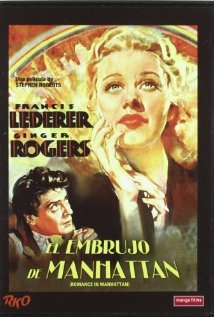
ROMANCE IN MANHATTAN
US, 1935, 77 minutes, Black and white.
Francis Lederer, Ginger Rogers, J.Farrell Macdonald, Donald Meek.
Directed by Stephen Roberts.
Romance in Manhattan is a very light comedy, but very genial and audience-friendly, with charming performances from both Francis Lederer and Ginger Rogers.
Lederer portrays Karel, a Czech migrant (in fact, he was from Czechoslovakia) not allowed into the United States at Ellis Island because he has insufficient money and is to be deported – but he jumps from the ship and is rescued, losing his wallet at the same time. He wanders the streets of Manhattan, eventually meeting a kind dancer, Sylvia, Ginger Rogers at her most charming, at the time of the musicals with Fred Astaire. She takes him in, letting him sleep on the roof, allowing him to help her with her young brother who is to be taken away from and sent to an Institute.
He is forever cheerful, seeing Manhattan through optimistic eyes, selling papers, truck driving, driving a taxi, befriending a local policeman, getting some money so that he can pay for his naturalisation. He is in love with Sylvia, moved when the judge says that if she were to marry, the brother would be returned to keeping, with Karel trying to arrange everything, a mercenary lawyer reporting him to the police, his relying on the goodwill of the New York police and their friendship, getting everything ready, injections, documents, Minister for the ceremony, and the incarceration of the lawyer. Happy ever after.
1. A genial light comedy of the 1930s? The presence of the stars the charm? The hopefulness, the dreams of the migrants from Europe? The reality of Manhattan? Persevering and helpful?
2. Production values, the cast, the scenes in New York City, apartments, the streets, the different jobs, the police? The musical score?
3. Karel, his Czeck background, his hopes, saving money, learning English, arriving at Ellis Island, the official refusal, his not having enough money, plans for deportation, on the boat, opening the porthole window, diving into the harbour, his being rescued, losing his wallet, wandering the streets, hungry, the donuts, Sylvia finding him, helping him, his refusal of money?
4. Sylvia, her age, responsible for her brother, his truancy, his selling the papers to get money? The ladies and interview and suggesting that Frank go to an Institute? Karel arriving, the arrangements, sleeping, helping with money, the musical show, its being closed and Sylvia having a job?
5. His jobs, helping Frank with the paper sales, driving the truck and the discussions with Murphy, driving the taxi, the strike, breaking the strike, being bashed? His eternal optimism?
6. Frank, his being taken by the authorities, in the court, Sylvia considered unable to look after her brother, the mention of marriage?
7. Karel, his enthusiasm, going to the lawyer, his being swindled of his the money, the money carefully in the bank, going to Murphy, getting his advice, the naturalisation, his technically being a criminal, Sylvia and Frank, aiding him? The police and their kindly interpretation, hostile to the lawyer? Arranging the details, the phone calls, the documents, injections, the minister? The ceremony, the continued interruptions? Happy ending?
8. A light comedy as the Depression situation was ending?
Published in Movie Reviews
Published in
Movie Reviews
Tagged under
Saturday, 18 September 2021 19:57
Colleen
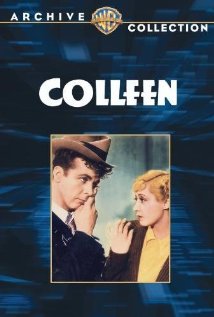
COLLEEN
US, 1936, 89 minutes, Black-and-white.
Dick Powell, Ruby Keeler, Jack Oakie, Joan Blondell, F. Hugh Herbert, Louise Fazenda, Paul Draper, Marie Wilson.
Directed by Alfred E.Green.
Colleen is the lightest of light comedies, with songs and dance, from Warner Brothers in the mid-1930s. It is a star vehicle for Dick Powell and Ruby Keeler, stars of many musicals at the studio at this time. It is also a comedy vehicle for Jack Oakie.
The plot is quite slight. Dick Powell portrays the enterprising business manager for his rather daffy uncle, F. Hugh Herbert, who contributed to the screenplay, whose behaviour is referred to in the film as “arrested development”. He is very wealthy, irresponsible, an eye for the women, ignoring his rather dipsomaniac wife, Louise Fazenda. When he visits his chocolate factory, and listens to the opinions of a young chocolate dipper, Minnie, Joan Blondell, he becomes infatuated, ringing her every night, planning to adopt her. He also installs her as dressmaker in an expensive department store where the accountant is Colleen, played by Ruby Keeler. The nephew doesn’t close down the store but becomes more romantically involved with Colleen – who is supposed to be the fiancee of Jack Oakie. But, he changes allegiances fairly quickly for Joan Blondell.
Love runs its course, not without difficulties, Colleen interpreting the business accountants’ closing down the store as the work of the nephew but, of course, it is not. She takes the payout and invests it in a store on a cruise ship. Jack Oakie and Joan Blondell also take a pay out.
Interspersed are a couple of songs for Dick Powell and Ruby Keeler (and not the greatest of singers) and some dance routines devised by Bobby Connelly in the Busby Berkely style, with Paul Draper as the principal name dancer, along with Ruby Keeler. And, there is a most elaborate fashion show, dozens of models and dozens dresses, beyond the power and finances of any department store. And it all culminates with a song and dance routine.
Director Alfred E. Green directed the Jolson story in the 1940s. But Ruby Keeler married Jolson at the age of 18, fallen out with him and wanted her name changed for the Evelyn Keyes character, Jolson’s wife, wanting nothing to do with him. And, at this time, Dick Powell was married to Joan Blondell.
Published in Movie Reviews
Published in
Movie Reviews
Tagged under
Saturday, 18 September 2021 19:57
My Husband, My Killer
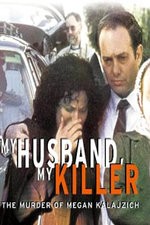
MY HUSBAND, MY KILLER
Australia, 2001, 95 minutes, Colour.
Colin Friels, Martin Sacks, David Field, Geoff Morrell, Chris Haywood, Craig Mc Lachlan, Lucy Bell, Tara Morice, Zoe Carides, Linda Cropper.
Directed by Peter Andrikidis.
My Husband, My Killer is based on facts, a crime of murder, the arrest of a Sydney businessman, Andrew Kalajzich, and his imprisonment for the murder of his wife. The film focuses, however, on the police and the work of Detective Bob Inkster, who received decorations after his investigation of this case.
The film also focuses on the police work, the nature of the investigation and the following of clues rather than details about the murder itself. However, there are sufficient graphic presentations of the murder and the body of Megan Kalajzich, to remind audiences of the gravity of the crime. Kalajzich himself did not commit the crime, asked his security assistant, Warren Elkins (Craig Mc Lachlan) to organise a hit man. There were mix-ups and an amateur tried several times to kill Mrs Kalajzich, ultimately succeeding.
Chris Haywood has a good role as the criminal hit man who was approached to do the job, kept some of the money, found that somebody else did the job, reported to the police, was wired and enabled the police to get information. He was paid a great deal – and didn't go to jail.
The standout is David Field as Bill Vandenberg, the man who actually did the murder. He is a timid kind of man, strangely accepting the commission to do the murder, botching it several times. He has some very good scenes while being interrogated by Bob Inkster, his ultimate confession – and his hanging himself in prison after giving testimony.
The film is a star vehicle for Colin Friels, well-versed in police and detective series like the Blackjack series and Water Rats. He brings his own intensity, especially with close-ups, as he listens to Kalajzich. Martin Sacks is also very good as the enigmatic Kalajzich. Lucy Bell is his secretary and mistress, Tara Morice is Mrs Inkster, Zoe Carides has a good role as a former girlfriend of Kalajzich who gives evidence, Linda Cropper is Megan Kalajzich. Geoff Morrell is also good as Inkster’s assistant.
The film is well-written by Greg Haddrick, veteran writer of many series like Underbelly as well as crime thrillers like The Society Murders. Direction is by Peter Andrikidis who has had a prolific career in television since the early 1980s.
1. The film based on actual events? The perspective of the film? Based on an investigative book? The role of the police and investigation? The crime, the accused?
2. The film made for television, the Australian audience? International? The parallels with other programs of police investigations, familiar material, well done?
3. A Sydney story, the views of the city and the harbour, the focus on Manly, the locations in Manly? The ordinary world? The luxury hotel? Homes? The police, offices, prisons, the contrast with the countryside? A sense of realism? The musical score?
4. The title, Megan and her introduction, pleasant with people, her wealth, her background? Twenty-three years married? Audience sympathy? The information about her death, the close-ups of her mutilated body? Her appearing in various flashbacks, relationship with her husband, children, the truth about her life? Her not suspecting her husband?
5. Andrew Kalajzich, the audience knowledge that he was guilty of his wife’s murder? The performance of Martin Sacks, convincing? His wife’s death, his rolling out of bed, his fabricated story? His personality? Relationships, his son, pregnant daughter – and the information about the car crash, his surviving, and his willingness to let his wife and son die? His reliance on Warren, his staff, the relationship with Marlene? The past relationship, promises and letters to Lydia? His feigning sadness? The arrest, the interrogations? His support from his parents, the Croatian background and codes of honour? The family meals and silence? People believing he was innocent? Seeing him behind the scenes, the gradual revelation, the affair with Marlene, his letters, going to Croatia? The family and the expectations? A self-made success?
6. The murder, the father and his declaration that a divorce would be shame? The point about paying money to hit men being less than a divorce settlement?
7. Warren, his character, roles, womanising, arrest, the interrogations, keeping silent, the lawyers? The pressure from Kalajzich and Kalajzich despising him? The final interrogation, his breaking, collapse? The deal for a shorter prison sentence?
8. Bob Inkster? Colin Friels’ presence, performance? Good at his job? The family sequences, the children squabbling, the outings, his wife, her advice about questioning Megan’s friends? His suspicions of Kalajzich? The intense close-ups, always watching him, thinking? The theories about what happened, the photos? Following leads? The information from George Cannellis? The drinks with him, his working with Bob Richardson? Persuading George to be taped, his discussions with Bill and the other hit man? His performance and trying to persuade Bill to give the information? Inkster’s discussions with the chief, permits, the arrest? Going to the plane to stare down Kalajzich? Finally following his wife’s advice, interviewing the women friends, their shutting the door in his face? The break with Lydia, the discussions, the letters? The interrogations of Bill, Warren? Trying to break them down? The breakthrough – and the arrest?
9. George, criminal, hit man, lack of moral perspective, keeping the money, giving information to Inkster? The wire? His performance with Bill – pressurising him?
10. Bill, George’s visit, a bespectacled quiet man, his motives for taking on the job, the money, the excitement? The variations on his story, concealing the truth? The pressures on him, the bribe to keep quiet? In the shower, the attempt on his life, his being saved? His decision to tell the truth to Inkster? The fast-forward and his hanging himself?
11. Marlene, her work in the hotel, her devotion to Kalajzich, the affair? Her finally walking away?
12. Kalajzich as a character, self-made, his background, his violence, his wandering eye? His pretence? The aftermath – his sentence, his continued protesting his innocence?
13. The truth of what happened – and the information given at the end of the film?
Published in Movie Reviews
Published in
Movie Reviews
Tagged under
Saturday, 18 September 2021 19:57
Vacation
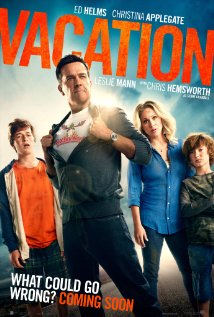
VACATION
US, 2015, 99 minutes, Colour.
Ed Helms, Christina Applegate, Skyler Gisondo, Steel Stebbins, Chris Hemsworth, Leslie Mann, Chevy Chase, Beverly D' Angelo, Charlie Day, Catherine Missal, Ron Livingston, Norman Reedus, Keegan- Michael Key, Regina Hall, Michael Pena, David Clennon, Colin Hanks.
Directed by John Francis Daley and Jonathan M.Goldstein.
If you are looking for intelligent comedy, this is not the place!
Back then, there was the humorous and satiric magazine, National Lampoon, probably best known for the film version of Animal House in the late 1970s. Then there were all kinds of Lampoon’s at the movies. One of the areas was vacation, both in the good old US, and at Christmas, as well as to Europe. And in those films, National Lampoon’s Vacation, the central characters were Mr and Mrs Griswold and their two children. The Griswold were played by Chevy Chase and Beverly D’ Angelo. The films were amusing in their way, lots of pratfalls, lots of awkward situations, touches of the vulgar, but acceptable enough for audiences in the 1980s and 1990s.
Vacation is not exactly a sequel or a remake – rather, this is the younger generation, the young boy of the old Vacation is now 40ish and has an idea that he should get his family to share in a nostalgical trip in his memory of his parents’ taking him and his sister to the theme park, Wally World. So far, so good.
The film is full of reminders of the past, this time with Ed Helms and Christina Applegate as the parents, with photos of the old parents – and, lo and behold, the new generation coming to San Francisco to stay with Rusty’s mother and father. It must be a long time since Chevy Chase was on screen because he is surprisingly older-looking than what we might have expected, larger, white hair (what the result it) but Beverly D’ Angelo looking an older version of what she used to look like.
Once again, there are all kinds of awkward situations, slapstick, pratfalls, misunderstandings and misinterpretations – but!!! This is 2015 so no-holds-barred for four letter interventions, even from the younger Griswold boy. There is no inhibition on sex language, sex talk, sex jokes – a step beyond the risque. Admittedly, some of this is funny, depending on your sex joke tolerance. And bodily functions are not left out – and seeing is believing when the family skip a queue lining up for hot springs in Arkansas, only to be maliciously advised to go on the back road, where the mud in the hot spring is not what we or the family expected because it is… (supply four letters).
Rusty is a pilot on an economy air company, Economair, with some comic touches that remind us of Aeroplane/Flying High. Debbie is at home trying to manage the two boys, the younger is murderably precocious, bullies his sensitive older brother who writes diaries and poetry, is not into fighting, and is at the stage of eyeing girls and becoming romantically infatuated.
Rusty hires an Albanian they had – which gives rise to a lot of slapstick jokes. There is an ominous truck driver with the final confrontation in the Arizona desert. They stop off in Missouri to go to Debbie’s old college where she finds she has a reputation for rather wild days – with some slapstick disasters as she tries to relive her past. There is an occasion where they sneak out to make love on the corner where force states meet, New Mexico, Texas, Utah, Arizona – only to find a long queue already there and police representatives from each of the State who start to assert their authority and draw their guns. And the jokey guide at the Grand Canyon goes suicidal during the white water rafting.
After they are robbed at the hot springs, they drive to Rusty’s sister’s place. The sister’s husband, is Stone Crandall, is played by Thor himself, obviously relishing the opportunity to do something American, something comic, something dumb, something which highlights macho prowess (and a large prosthetic appendage). The couple are played by Lesley Mann and Chris Hemsworth.
Yes, there is a lot of soul-searching, the younger brother put in his place, the older brother experiences the touch of romance, a reconciliation between husband and wife who appreciate better what they have – and a visit to Wally World and the biggest and longest rollercoasters (and amusing pratfalls).
There are cameos from Colin Hanks, Ron Livingston, Norman Reedus, Michael Pena and Charlie Day – all getting a bit of extra pocket money!
Perhaps it is best to say that this is American comedy, for the multiplex audience, and its status in 2015, styles of comedy, visual and verbal, raucous and coarse, – and the memory that the earlier Griswold’s also had a European vacation, so…
Published in Movie Reviews
Published in
Movie Reviews
Tagged under
Saturday, 18 September 2021 19:57
Wanderlust
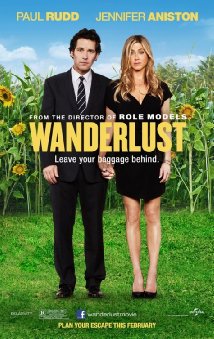
WANDERLUST
US, 2012, 98 minutes, Colour.
Paul Rudd, Jennifer Aniston, Justin Theroux, Alan Alda, Mallin Akerman, Ken Marino, Joe Lo Truglio, Kathryn Hahn, Kerri Kenney- Silver, Lauren Ambrose, Linda Lavin.
Directed by David Wain.
Wanderlust is a variation on the American romantic comedy. This time the central characters are middle-aged, and are played by Paul Rudd and Jennifer Aniston, George and Linda, each at their best. They play a couple, married for some time, wanting to buy an apartment in New York City, a studio loft – and there are amusing interchanges between the couple and the agent, played by veteran Linda Lavin in very dry style – but he loses his boring job when his company is close because of fraud and she has her ambitions thwarted when she tries to pitch to HBO a documentary about penguins with testicular cancer! They can’t afford the loft and go out on the road.
On the way to George’s brother in Atlanta, they veer into a motel which turns out to be a commune, after they are initially disturbed by finding a nudist on the path. They stay overnight, partly drawn into the communal life, the commune having been founded in 1971 with Alan Alda still there after almost 40 years. However, the leader of the commune, acting very much like a bearded charismatic sect leader is Seth, played by Justin Theroux (interestingly several years before he and Jennifer Aniston were married in real life). There are assorted other characters, especially Kathryn Hahn as an angry woman eager to burst out at any provocation, a mixed crowd race couple, and a friendly woman organiser as well as an over-friendly woman who advocates of free love principle of the commune.
George and Linda have varying experiences, George finding the group intrusive, although he indulges in physical exercises for exercising angers, but can’t accept the open group where Linda is encouraged to tell the truth about all her difficulties and emotions against George. Linda is wary at first, then she joins in the spirit of the commune, even opened to the principle of free love – which George really is not.
Another complication is that a company wants to buy the grounds and they want to find the deed of ownership so that the commune leader can keep the commune – which leads to some shady behaviour on the part of Seth. There are scenes of protest and resistance, Linda joining in bare-breasted protest which finishes up on television.
There are many satiric moments, especially George’s visit to his brother and the brother’s boast about himself, his company, his wealth, his wife and his house.
Ultimately, there is happy ending, especially as regards the nudist who is trying to write his novel, initially not approved of by George, but revising with George enthusiastic – and Geroge and Linda forming a publishing company, Wanderlust.
The film was directed by David Wain, a friend of Paul Rudd who appeared in Wain’s films like Ten, Role Models.
1. A variation on the romantic comedy? A middle-aged couple? Careers, homes? Difficulties, on the road, communes?
2. New York life, the US road, the commune, affluent life in Atalanta? The musical score?
3. The commune, the property, housing, the interiors of the buildings, common life? The hippie tradition, nudist, moral freedoms…? Founded in 1971?
4. The title, the experience of George and Linda? The end and their publishing company?
5. The basic situations: George, his boring job, income, discussions with his friend, the company folding, his being fired? Linda, her documentary about the penguins with testicular cancer, the cynical producers? Their wanting to buy the loft? The estate agent, deadpan arguments and explanations? Buying the loft? Small, settling in, the brother ringing from Atlanta, looking at everything by Skype, comparing his own way of life? The loss of jobs, going to the agent, trying to sell again, double talk?
6. Going on the road, singing, talking, hopes, tired, the motel, the nudist, crashing the car, their fears?
7. The personalities at the commune, welcoming George and Linda, the room, tired, going downstairs, George playing, singing and dancing? The drugs? The change of attitude? Puzzles? George and Linda having different attitudes towards the commune?
8. Carvin, Alan Alda and his veteran status, reciting the list of friends, his role in the commune, founder, 1971? His slipping out on Sunday to the diner to have ordinary food? Seth as the leader? The pressures to sell the property, the company wanting it? The disappearance of the deed? The irony of discovering it, Seth and his double-dealing, burning the deed? The irony that Janice was still alive, had a copy of the deed – and all the other people on the list were still alive and joining Carvin at the end?
9. Seth in himself, his manner, appearance, cult leader, alleged non-violence, his intervening in people’s lives, wanting respect, his language, the attraction towards Linda? The open group, George upset, Linda opening up, her frank statements? Seth and his work in with George, the exercises to eliminate anger? The irony of his deal? Wanting to go to Miami and buy a beachfront? Selfish, George finally confronting him?
10. George’s brother, life in Atlanta, his wife, the bravado, the lifestyle, the petulant son? Giving George the job, the two keeping an eye on each other in the office? His brother firing him, re-hiring, the jokes? George and his exasperation, leaving and going back to the commune? His second return, his brother’s wife and her knowledge of the truth, her exasperation, the comeuppance of her husband?
11. The demonstration against the developers, the bare breasts, Linda and her exposure, on television, everybody watching?
12. The women at the commune, Cathy and her welcome, explanations, the different room when they settled in, no door, the difficulties of going to the toilet with people coming in and talking? Eva, pleasant, seductive? Karen, rabid, the complaints, aggression, prejudices? Supporting Linda?
13. The husband and wife, the interracial marriage, the bland comments, the husband and his pleasantness, with George at the toilet, borrowing the car, it finishing up in the lake?
14. The novelist, the nudist, his ideas, writing his book, George reading it in disliking it, making comments – and the novelist changing it, giving George the manuscript, his liking it, the publication, the television interviews?
15. The atmosphere of freedom, free love, Eva and her attraction towards George? Seth and Linda? The ideas, in favour, not in favour?
16. Each telling the truth, the mutual accusations, George leaving, promise of the job, his not getting it, his return to his brother?
17. Linda, going to eat in the diner, meeting Carvin? The exposure of Seth?
18. The year passing, the couple together, the publication of the novel, their company, the television interviews, and the estate agent and her blind
husband – and his assuming for years that she was black!
Published in Movie Reviews
Published in
Movie Reviews
Tagged under
Saturday, 18 September 2021 19:57
Play it Safe
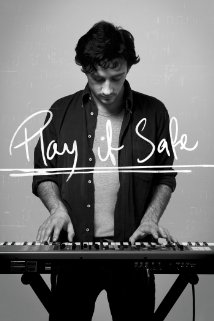
PLAY IT SAFE
Australia, 2015, 91 minutes, Black and white.
Nicholas Kato, Maya Aleksandra, Christine Lui, Alasdair Tremblay-Birchall?, Clayton Jacobson, Christina Kato, Spencer Gigacz, Kane Felsinger.
Directed by Chris Pahlow.
Play it Safe is a micro-budget film, made locally in Melbourne, utilising suburban locations as well as sequences in the city. It has also been filmed in black and white, to advantage in presenting the perspective on characters in the city.
The principal appeal of the film will be to the under-30s, the young adults trying to begin a career, especially in music, performance and composition. There is a variety of music, some rap songs, touches of jazz, some personal, moving towards classical composition in sequences of playing simply at home or in performance in clubs.
Nicholas Kato plays Jamie, in his mid-20s, part of a band who have been on tour but people have not gone out to see and hear them. They are still rehearsing, but squabble and the band disbands.
Jamie plays quietly at home, an introspective character, put upon by his room mate, Jeff (Alasdair Tremblay- Birchall, actor and writer for such TV programs as Sean Micaleff’s Mad as Hell), unable to respond to playing at a girlfriend’s exhibition opening, criticised by his father (Clayton Jacobson) who is urging him to do something worthwhile.
The film picks up as it moves along, audiences becoming used to Jamie, understanding him better, liking him more. This is especially the case when he does an interview with a rather I-am, Alpha-male founder of a small college for teaching music, with strict instructions to keep to his absolutely worked out curriculum. There is an amusing collage where we see Jamie meeting a variety of students, an enthusiastic older woman, a little girl, a seemingly indifferent boy, and Spencer, who really does not want to be there and how much he prefers to play with his Rubik cube and to read out the fantasy stories that his parents do not approve of.
There is some brightness in Jamie’s life when he is attracted to the secretary of the college, Chloe (Christine Lui) and they date for a while – although she is put off when he invites her home and they have a conversation with Jeff, and she is upset that Jamie doesn’t intervene to defend her.
Obviously, things will not go too well at the college and Jamie has to look further employment, the relationship with Chloe lapses, he meets the former girlfriend again, gets a new and seemingly worthwhile job, using his personalised methods of interacting with the students rather than an imposed curriculum, and, he is still moving towards 30…
1. A modest, small-budget film? Local, Melbourne? Likeable?
2. Black-and-white photography, the local flavour, the scenes of Melbourne, flats and homes, clubs and bars, exhibitions, school, migrant offices and classes?
3. The music, the theme, Jamie and his playing, compositions, playing at home, with the band, the rap songs, jazz? The music classes? His final composition, performance?
4. The title, the emphasis on playing, Jamie and his being safe, not taking risks? The change, the challenge before he turned 30?
5. Jamie, his character, age, appearance, his hair and cover, playing, introspective, Jeff interrupting, teasing him, playing monopoly, Jamie resisting? Helping the boy and his rhythms on the computer? Late for the rehearsals, the band and his playing, the failure of the tour, losing money, the arguments between the group, disbanding, the meal with his parents, the issue of the giving him money? His father’s strictures? Sarah, going to the exhibition, his offering to help, her asking him to play, his not being able? Getting the job, the interview with Craig, Craig and his curriculum, success, the collage of the students and their range, old and young, the old lady enjoying it, the young girl, Spencer and his wanting to talk about his fantasy story, the Rubik cube, not wanting to learn the piano? Jamie and Craig, Craig tough, emphasis on the curriculum, reading the riot act, firing him? Chloe, the work, pleasant, going out, the night together, talking, going home, Jeff and his talk, Chloe saying that Jamie should have intervened to defend her? The relationship collapsing? The encounter with Sarah, the bond, night together, her plan for Berlin? His going to see the migrants, teaching with his own engaging method, not a curriculum? His father being satisfied? Composing, travelling the city, the views? Playing, the acclaim? The airport to Sarah? Future?
6. Chloe, secretary, working for Craig, going out, the sex, the evening talking with Jeff, thinking he did not like her, wanting Jamie to stand up for her? The relationship collapsing?
7. Sarah, friend, his declining to play at the exhibition, meeting her again, her plans for Berlin, the relationship? At the airport?
8. Jeff, his patter, comic touches, playing monopoly, the extended song about his being An Accountant? The lyrics? Persuading Jamie to get out?
9. The band, personalities, performance, the rap songs – and their presence at the end?
10. Craig, sure of himself, starting his company, his teachers and the meeting, reading the riot act, his curriculum and being sure, with Jamie and the difficulties with Spencer, the parents paying the money, letting Jamie go?
11. The scenes with his parents, his father’s opinions, giving the money? Finally agreeing – and the challenge before he turned 30?
12. The music director, the agreement, the preparation of the gig, the final performance and acclaim?
13. A slice of Melbourne life – and the challenges for young adults?
Published in Movie Reviews
Published in
Movie Reviews
Tagged under
Saturday, 18 September 2021 19:57
Hustle & Flow
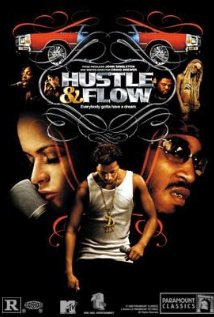
HUSTLE & FLOW
US, 2005, 116 minutes Colour.
Terrence Howard, Anthony Anderson, Taryn Manning, Taraji P. Henson, DJ Qualls, Ludacris, Isaac Hayes.
Directed by Craig Brewer.
Hustle & Flow was a star vehicle for Terrence Howard. He is said to have spent a month living in a brothel as well as meeting with many pimps to try to understand them and incorporate them into his performance. He also contributed to the song, especially “It’s hard out there for a pimp” which won an Oscar for best song.
The setting is the city of Memphis, a poorer area, African- American area, with a pimp who operates his prostitute from a car, drivers-by picking them up, returning her, he collecting the cash.
However, he also wants to be a composer and singer, and admiring the successful singer, Skinny (Ludicrus) from Memphis. He relies on his friend, Key (Anthony Anderson) and, from the local church, Shelby ( DJ Qualls). They build a studio at home, work on compositions and lyrics, Djay’s friend, the pregnant Shug (Taraji P. Hensen) for singing the melody chorus.
They work hard at the singing, with the prostitute, Nola (Taaryn Manning) simply turning off the electric fan when necessary but, finally, interested by Djay with the promoting of the record, especially after his imprisonment when he attacks Skinny. Ironically, in prison, he is consulted by some of the police who will also try to promote their songs.
While there is a squalid background to the story, there is some hope and people breaking out of constrictions. Director, Craig Brewer, also directed the striking Black Snake Martin as well as the remake of Footloose.
1. Audience impact? Critical success? Oscar win with the song, nominations? African- American audiences, themes? Universal?
2. The city of Memphis, the city, its people, the neighbourhoods, black, poor, the streets, prostitution, views? The contrast between affluence and poverty? The studio, music? The areas, violence, the club, prison?
3. The musical score, the contribution of Terrence Howard, lyrics and rhythms, hopes for a career, singing, Key and his work, Shelby? The building of the studio, rehearsals, composition? The singing? Improving the lyrics, the approach to Skinny, the help, no help? The radio and final success?
4. Terrence Howard and his research, his manner, pimp, interactions with Nola, the clients, the aftermath, the money? On the streets? Pimps, the girls and his treatment?
5. The clubs, stripping, prostitution, the men? The girl in the house, the baby, her harshness towards Djay? The confrontation with him and leaving?
6. Shug, quiet, Djay, invited to sing, the birth of the baby, finding her identity in singing?
7. Nola, her background, education, with Djay, the range of clients, in the car, afterwards, the money, talking with Djay, money, observing? The recordings, turning off the fan? The success, violence and her reaction? Djay and his talking about her being in charge, canvassing the music with the DJs, the companies, her identity and final success?
8. Key, well off, relationship with his wife, his job, his manner, the meals at home, his wife and control? Personality, age, experience, friendship with Djay, interest in the music, hesitant, being persuaded? The church, inviting Shelby? Building the studio? The preparations, the work, playing the music, the rhythms, the lyrics? The issue of the microphone, buying the equipment? Developing the lyrucs and rhythms – hard out there for a pimp? Shug and the singing, his wife’s visiting and change of heart? The songs and their achievement? Recordings, the tape? The possible disaster – but success?
9. Skinny, his success, television, at the clubs, DJ and going to meet him, listening to him, Skinny wanting the drugs, the brush off, collapse, Djay’s anger, the shooting?
10. Djay and Shug, the birth of the baby?
11. Djay in prison, accepting his fate, the police and their music and his advice in jail?
12. Nola, going to the radio stations, the DJs playing it, to listen, Shelby listening, Djay in jail?
13. A sense of achievement despite difficulties, an ending in hope?
Published in Movie Reviews
Published in
Movie Reviews
Tagged under
Saturday, 18 September 2021 19:57
Postman's White Nights, The

THE POSTMAN’S WHITE NIGHTS
Russia, 2014, 90 minutes, Colour.
Aleksey Tryapitsin.
Directed by Andrey Konchalovskiy.
The Postman’s White Nights takes us to northern Russia, an area known to audiences from such forms as Leviathan.
This film is semi-documentary in tone, showing the life of a group of people in the village, on, waking in the morning, going about their business, the postman on his boat, goingto the post office, collecting the mail, flirting with the assistant, visiting various characters and delivering their mail. This is an interesting visual portrait of the postman and his life – but with no mention of what life was like during the time of the Soviet Union.
Amongst the variety of characters, where vodka is drunk plentifully, is a woman to whom the postman is attracted, and her young son, whom he takes into the city of Archangel on one of his trips, to her upset. She has decided to move to the city which makes it difficult for the postman although he helps her with the moving and going to the train.
The motor from his boat is stolen at one stage and he is critical of a family, finding them celebrating lavish meal, which he assumes is the proceeds of his motor.
There is another old character, vodka-sodden, but friendly to the postman.
The film was directed by Andrey Konshalovskiy, who began his career at home in the Soviet Union, moved to the United States during the 1980s, making a number of films including Maria’s Lovers, The Runaway Train, and the Sylvester Stallone vehicle, Tango and Cash.
With the fall of the Soviet Union, he returned home to make a number of films in Russia.
1. A Russian story, the north of Russia, the landscapes, the village, the city of Archangel?
2. The director and his career in Russia, the United States, internationally? His feel for place, people, way of life? The changes from the era of the Soviet Union?
3. The locations, the realism, the houses, the Post Office, the range of deliveries to different people? The city, the supermarket and the Plaza? The variety of landscapes? The musical score?
4. The portrait of the postman? His narrative about the photos, explaining them, the connections, the history of drink? His being alone, waking, the water from the lake, the pump and washing, his breakfast, the television? His boat and the motor, going, the Post Office and his flirting with the woman? pensions, letters? Chatting with people? The Bun? The sailor and his sisters? Irina and Tomko? Relating to people? The postman and his motor, accusing the sailor, the fight? Taking the boy into the city, ice cream, his not drinking alcohol, ice cream instead? The return, the bus, Irina and anger? His visiting, massage, leaving? The visit to his sister? An ordinary man and an ordinary life?
5. Irina, the son, ordinary life, the money, and the postman, his flirting, the massage, no sexual relationship? Move to the city with her son, a new job, at the station, asking the postman to look after the documents?
6. The boy, his mother, the friendship with the postman, his dancing monkey toy, the ice cream in the city, his not wanting to go to the new house?
7. The Bun, character, old, alcoholic, his pension, alone, the television?
8. The family, at the meal outside, the theft of the motor or not? The clash and the fight?
9. The range of locals, their interaction with the postman?
10. The Cosmos Centre, the visit? Russia and the past, space, the sending of the rocket, taking off over the ordinary landscapes and people? The future, modern? The heritage from the Soviet past?
11. The modern city, the Plaza, the shops, the ice cream, the alcohol and the uncertainty of the server?
12. The postman, staying at home, resuming his ordinary life?
13. Russia in the 21st century – no mention of the past, of the experience of the Soviet Union?
Published in Movie Reviews
Published in
Movie Reviews
Tagged under